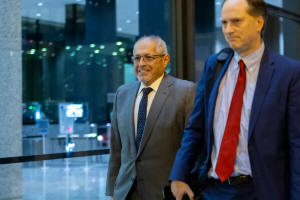‘You agreed to wear wires against your ComEd family’: Star witness in
Madigan trial grilled on cross-examination
 Send a link to a friend
Send a link to a friend
 [November 15, 2024]
By Hannah Meisel [November 15, 2024]
By Hannah Meisel
CHICAGO – Before the sun rose on a cold Wednesday morning in January
2019, Fidel Marquez agreed to a life-altering assignment as a
cooperating witness in a criminal case the government was building
against his colleagues at electric utility Commonwealth Edison and
powerful Illinois House Speaker Michael Madigan.
Marquez agreed to the request without consulting an attorney or any of
the family members in his mother’s Hammond, Indiana, home where a pair
of FBI agents showed up at 6 a.m. on Jan. 16, 2019. Marquez stood with
the agents in the foyer as they played him a few recordings of phone
conversations with his colleagues they’d intercepted via a wiretap on
Marquez’s cell phone.
While Marquez was still in the clothes he’d worn to bed, the agents
asked for his cooperation. And as others in the house began to wake up,
Marquez got dressed and met the agents in the parking lot of a nearby
strip mall, where he climbed into the back of an FBI vehicle and learned
more about what he’d be expected to do as a cooperating witness.
“Did they say you were in trouble?” Madigan attorney Tom Breen asked
Marquez on Wednesday.
“When FBI comes knocking at the door at six in the morning, it’s
obviously for something,” Marquez said. “I don’t know that they said I
was in trouble but they played the tapes for me and I got a sense that
this was not good.”
“That would frighten you, wouldn’t it?” Breen asked of a surprise early
morning FBI visit.

“I was scared,” Marquez acknowledged.
The ComEd exec-turned-FBI mole spent a fifth day on the witness stand
Wednesday in Madigan’s bribery and racketeering trial. Many of the 23
charges the former speaker faces revolve around an alleged bribery
scheme wherein ComEd gave jobs and contracts to Madigan allies over a
period of 7 ½ years in exchange for favorable legislation for the
utility in Springfield.
In cross-examining Marquez, Breen sought to paint the government’s star
witness as opportunistic, motivated to cooperate – and later agree to a
plea deal – to save his own skin.
Asked if the FBI offered Marquez “any inducement” the morning of Jan.
16, 2019, to get him to “set up” his four closest ComEd colleagues, whom
he also called friends, Marquez claimed he couldn’t remember. Those
colleagues would later be charged with bribery as a group and convicted
in last year’s “ComEd Four” trial.
“You were in the ComEd family, weren’t you?” Breen asked. “You
celebrated birthdays together, I’m sure you drank together, ate together
… you testified your office was 50 feet away from Anne’s (former ComEd
CEO Anne Pramaggiore’s) office.”
“Yes,” Marquez said.
“You agreed to wear wires on your ComEd family,” Breen said.
“Yes,” Marquez said again.
At the time of the FBI approach, Marquez was nearing his seven-year
anniversary as ComEd’s senior vice president for governmental and
external affairs. In that role, Marquez oversaw approximately 135
employees in addition to a roster of contract lobbyists that could grow
as large as 40 during years when ComEd was most active in pushing for
legislation in Springfield.
At the top of that roster for decades was Mike McClain, who was also a
close friend and advisor to Madigan. Earlier in the trial, the jury
heard wiretapped calls in which McClain referred to himself as an
“agent” of the speaker and said Madigan was his “real client.”
And as part of his job as the lobbyist assigned to Madigan, McClain
passed along dozens of job recommendations from Madigan to Marquez, to
the point where “it was annoying to deal with, yes,” Marquez said
Wednesday in response to a question from Breen.
McClain, who was convicted as part of last year’s ComEd Four trial and
is Madigan’s co-defendant in the current trial, was one of the
colleagues the FBI was most interested in Marquez getting on tape. In a
few videos Marquez secretly recorded that the jury saw last week,
McClain discussed longstanding arrangements for a few Madigan political
allies whom ComEd indirectly paid several thousand dollars per month for
little to no work.

During his cross-examination as a witness during last year’s ComEd
trial, Marquez acknowledged that he told the FBI early on that “I did
nothing illegal” and did not believe that he’d bribed Madigan during his
years as ComEd’s chief lobbyist.
But U.S. District Judge John Blakey this week barred defense attorneys
from asking Marquez if he believed he’d done anything “illegal,” and
Marquez was much more defensive when asked whether he believed he’d done
anything “wrong.”
Under questioning from McClain attorney Patrick Cotter, Marquez
acknowledged that he’d hoped he would avoid charges by agreeing to
cooperate with the government. But in late 2019 or early 2020, he was
informed charges would be coming.
“And up to that point, had you been consistent in your meetings with the
government denying any wrongdoing in connection to this activity?”
Cotter asked.
“I believed what was going on was wrong,” Marquez replied. “Is that what
you’re asking?”
[to top of second column]
|

Fidel Marquez, a former Commonwealth Edison
executive-turned-cooperating witness, leaves the Dirksen Federal
Courthouse with his attorney on Tuesday, Nov. 12, after his fifth
day of testimony in the bribery and racketeering trial of former
Illinois House Speaker Michael Madigan. (Capitol News Illinois photo
by Andrew Adams)

Judge Blakey blocked Cotter from attempting to ask the question again,
so Cotter moved on to outlining Marquez’s eventual plea deal, which he
accepted in September 2020. The deal involved Marquez pleading guilty to
one count of conspiracy bribery and his continued cooperation, including
testifying at the ComEd and Madigan trials.
In exchange, prosecutors told Marquez they would recommend probation for
the charge, which normally carries a five-year maximum prison sentence.
“But did you also understand, sir, that if you continued to deny
wrongdoing and not plead guilty, you’d be charged with multiple crimes
and face a potential sentence of up to, I think you testified on direct,
34 years?” Cotter asked.
“Yes,” Marquez said.
It was a much more subdued version of the dramatic confrontation Cotter
had with Marquez during last year’s ComEd trial, where Cotter accused
Marquez of selling out his friends to avoid prison.
Breen tried to double down on Marquez’s change of heart in his
cross-examination of Marquez, pointing out that Marquez finally retained
an attorney in September 2019 – nine months after he began cooperating
with the government and four months after his status as a cooperating
witness was revealed. One of the first things Marquez asked his lawyer
to do, Breen suggested, was to maintain his claims of innocence.
“Did you tell the attorney to tell them (prosecutors) that the requests
to employ these five individuals were not remarkable and that the
requests were no more or less significant or unusual than similar
requests from any number of other legislators?” Breen asked.
“I don’t know what my attorney told them,” Marquez shot back, avoiding
answering the question directly.
Both Breen and Cotter also spent time on Wednesday attempting to
undermine Marquez’s credibility by pointing to various legal tangles,
including earlier this year when he tried to purchase a gun.
Marquez, who now lives in Tucson, Arizona, told Breen he tried to buy a
semi-automatic pistol to kill snakes that come “right up to my door.” In
filling out paperwork to buy the gun at a pawn shop, Marquez checked
“no” on the parts of the form that asked if he was “under indictment or
information” or had been convicted of a felony for which a judge could
have sentenced him to more than a year in prison.

Because he’d been allowed to keep the two guns he already had despite
his felony plea, and because he did not remember in that moment that
he’d been charged under a criminal “information,” Marquez said his
failure to fill out the paperwork was an “honest mistake.” The U.S.
Attorney’s office in Arizona declined to press charges.
Cotter attempted to use the incident to cast doubt on the accuracy of
memories Marquez testified to under questioning from a government lawyer
last week, while Breen laid into him for breaking federal law while
awaiting sentencing on his felony charge.
Marquez acknowledged that while he sought to buy a gun, he’d sent his
dog to “snake avoidance school” to learn to deal with the reptiles.
“You should’ve gone to snake avoidance school then you wouldn’t have
violated federal law,” Breen quipped.
Cross-examination also dug into Marquez’s contentious divorce.
“Is it not a fact that you attempted to hide from your wife and the
court $400,000 in assets you had?” Cotter asked about Marquez’s 2014
divorce court battle.
Marquez acknowledged that he had, and in later questioning from Breen,
admitted that he considered transferring the money to his
then-girlfriend but didn’t go through with it. Because he “returned the
money,” Marquez said he didn’t think to mention the episode to
prosecutors. It ultimately came out during a dramatic moment during his
cross-examination in last year’s ComEd trial, though the judge quickly
shut down that attorney’s line of questioning.
Breen also questioned Marquez about a 2022 incident in which he was
found in civil contempt of court for refusing to give $23,000 worth of
stock to his ex-wife.
“You were threatened, as a matter of fact, with jail time if you did not
transfer certain stock or assets,” Breen said. “And when you’re
threatened with jail you comply.”
Marquez acknowledged that he “ended up complying, yes.”
The witness will be back on the stand for what’s likely to be his last
day on Thursday. Meanwhile, in a courtroom five floors above Blakey’s,
another judge will hear arguments for acquittal in the case of former
AT&T Illinois President Paul La Schiazza.
A jury in September deadlocked after sitting for a trial in which
prosecutors accused La Schiazza of bribing Madigan in a similar scheme
to ComEd’s, albeit smaller.
Capitol News Illinois is
a nonprofit, nonpartisan news service that distributes state government
coverage to hundreds of news outlets statewide. It is funded primarily
by the Illinois Press Foundation and the Robert R. McCormick Foundation.
|